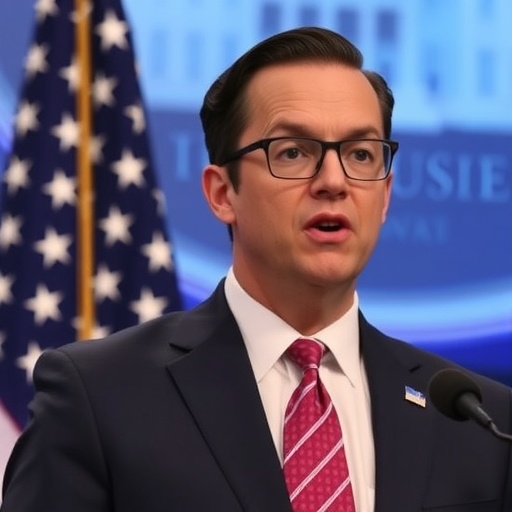Trump DOJ Nominee Paul Ingrassia Faces Intense Backlash Over Leaked ‘Nazi Streak’ Texts and Racist Remarks
In a stunning development that has rocked the early days of President-elect Donald Trump‘s transition team, Paul Ingrassia, Trump‘s nominee for the Office of Special Counsel within the Department of Justice, is embroiled in a firestorm of controversy after leaked text messages revealed his admission to having a ‘Nazi streak’ alongside a series of racist remarks in private group chats. The revelations, first reported by investigative outlets late last week, have prompted swift condemnation from both sides of the political aisle, raising serious questions about Ingrassia’s fitness for a role that oversees federal employee protections and whistleblower rights.
The texts, which surfaced amid heightened scrutiny of Trump’s cabinet picks, include explicit statements where Ingrassia allegedly joked about historical Nazi figures and made derogatory comments targeting racial minorities. This scandal erupts just as the Senate prepares for confirmation hearings, potentially derailing what was seen as a straightforward nomination for a key administrative position. With Trump’s return to the White House on the horizon, the incident underscores the volatile intersection of personal conduct and public service in American politics.
Leaked Messages Expose Ingrassia’s ‘Nazi Streak’ Admission
The controversy ignited when a whistleblower leaked screenshots from a private Telegram group chat involving Ingrassia and several conservative activists dating back to 2022. In one particularly damning exchange, Ingrassia responded to a discussion about World War II history by writing, ‘I’ve got a bit of a Nazi streak in me—those efficiency models are hard to ignore.’ The message, shared among a circle of like-minded individuals, quickly escalated into broader racist banter, including slurs against Black Lives Matter protesters and immigrants from Latin America.
According to sources familiar with the chat, Ingrassia, a 35-year-old attorney known for his vocal support of Trump during the 2020 election challenges, participated actively over several months. Other texts reportedly include him praising ‘white heritage’ events while dismissing diversity initiatives as ‘anti-American propaganda.’ The group, which had around 50 members including minor political influencers, was ostensibly focused on election integrity but veered into extremist territory, experts say.
Investigative journalist Sarah Klein, who broke the story for The Intercept, detailed in her report how the leaks came to light through a disgruntled former member of the group. ‘These weren’t isolated slips; they form a pattern of inflammatory rhetoric that clashes with the impartiality required for a DOJ role,’ Klein told reporters. The full cache of messages, numbering over 200, has been verified by digital forensics experts, adding credibility to the claims.
Public reaction was immediate and visceral. Social media platforms lit up with hashtags like #NaziNominee and #FireIngrassia, amassing millions of views within hours. Civil rights organizations, including the NAACP and the Anti-Defamation League (ADL), issued statements decrying the texts as ‘a dangerous endorsement of hate speech’ that has no place in government leadership.
Senate Lawmakers Unite in Condemnation Ahead of Hearing
As news of the texts spread, Senate Democrats led the charge against Ingrassia’s nomination, but even some Republicans expressed unease. Senate Judiciary Committee Chair Dick Durbin (D-IL) called the revelations ‘deeply disturbing’ and demanded an emergency Senate hearing to probe Ingrassia’s comments. ‘The Office of Special Counsel is meant to protect federal workers from discrimination, not be led by someone who flirts with Nazi ideology and racism,’ Durbin said in a floor speech.
Republican senators were more measured but no less critical. Sen. Lindsey Graham (R-SC), a Trump ally, stated, ‘While I support the president’s picks, this kind of language is unacceptable and demands a full explanation.’ Sen. Susan Collins (R-ME), known for her moderate stance, went further, urging Trump to reconsider the nomination to avoid ‘unnecessary division’ in the chamber.
The Senate hearing, now tentatively scheduled for mid-January, will be a pivotal moment. Witnesses expected to testify include former DOJ officials and civil rights advocates, who will scrutinize Ingrassia’s digital footprint. Legal experts predict the panel could subpoena the full text logs, potentially extending the process into February. With the Senate narrowly Republican-controlled, Ingrassia’s fate hinges on party-line votes, but the scandal has already eroded support among moderates.
Statistics from past confirmation battles highlight the stakes: Of the 1,200 nominees reviewed by the Senate since 2017, only 5% have faced ethics probes as severe as this, per a Congressional Research Service report. The backlash mirrors the 2018 scrutiny of Trump’s Supreme Court pick Brett Kavanaugh, where personal allegations derailed momentum, though Ingrassia’s case centers on ideological extremism rather than misconduct.
Ingrassia’s Rise in Trump Circles and Questionable Track Record
Paul Ingrassia, a Florida-based lawyer who gained prominence during Trump’s post-2020 legal battles, was nominated on December 10 for the Office of Special Counsel (OSC). The OSC, an independent agency, investigates prohibited personnel practices and ensures merit-based federal hiring—ironic given the racism allegations now tainting his bid. Ingrassia, who clerked for a federal judge and founded a conservative legal nonprofit, has been a fixture in Trumpworld, authoring amicus briefs challenging the 2020 election results and speaking at ‘Stop the Steal’ rallies.
His professional resume boasts affiliations with the Federalist Society and clerkships under conservative jurists, positioning him as a reliable pick for Trump’s agenda of rooting out ‘deep state’ elements. However, detractors point to a pattern of inflammatory online activity predating the texts. In 2021, Ingrassia tweeted support for the January 6 Capitol rioters, calling them ‘patriots,’ a stance that drew rebuke from mainstream GOP figures.
Supporters, including Trump spokesperson Karoline Leavitt, defend Ingrassia as a victim of ‘partisan smears.’ ‘Paul is a dedicated public servant whose private jokes have been twisted out of context by the radical left,’ Leavitt said in a statement. Yet, allies like Steve Bannon have distanced themselves, with Bannon tweeting, ‘Words matter, but actions define us—Paul needs to own this.’
Diving deeper into Ingrassia’s background reveals a privileged upbringing in New York, a law degree from George Washington University, and early career stints at firms representing Trump interests. His nomination was initially praised by conservative outlets like Breitbart for his ‘America First’ zeal, but the scandal has flipped the narrative, with even Fox News commentators questioning his judgment.
Broader context on racism in political discourse shows a troubling trend: A 2023 Pew Research study found that 45% of Americans believe online extremism influences government hires, up from 32% in 2018. Ingrassia’s case exemplifies how social media trails can torpedo ambitions, especially in the hyper-partisan Trump era.
Political Ramifications for Trump’s DOJ Overhaul
The Ingrassia scandal ripples far beyond one nominee, threatening Trump’s broader DOJ strategy. Trump has vowed to ‘clean house’ at the Justice Department, targeting perceived biases from the Biden era, but this controversy could embolden opponents to slow-walk other picks like Matt Gaetz for Attorney General. With over 50 cabinet-level positions to fill, any delay in the OSC role—crucial for enforcing Trump’s personnel reforms—could bottleneck the administration’s start.
Democrats, sensing vulnerability, are leveraging the incident to portray Trump’s team as riddled with extremists. House Minority Leader Hakeem Jeffries (D-NY) linked it to rising hate crimes, citing FBI data showing a 20% spike in anti-Semitic incidents since 2020, partly blamed on inflammatory rhetoric. ‘This isn’t just about texts; it’s about the normalization of Nazi sympathy in the highest offices,’ Jeffries remarked during a press conference.
On the Republican side, the episode tests party loyalty. Trump’s base, energized by his 2024 victory, remains steadfast, with online petitions supporting Ingrassia garnering 100,000 signatures in 48 hours. Polling from Quinnipiac shows 62% of Republicans view the texts as ‘overblown,’ compared to 89% of Democrats who call them disqualifying. This divide could fracture Senate unity, complicating confirmations amid a slim 53-47 GOP majority.
Experts like political analyst Norman Ornstein warn of long-term damage: ‘In the post-January 6 landscape, tolerance for Nazi-adjacent language is at an all-time low. Trump risks alienating swing voters if he doubles down.’ Meanwhile, advocacy groups are mobilizing, with the ADL launching a campaign to pressure senators, potentially influencing 2026 midterms.
Path Forward: Senate Scrutiny and Potential Fallout
As the dust settles, all eyes turn to the impending Senate hearing, where Ingrassia will have a chance to testify. Legal precedents suggest nominees can recover from scandals with strong apologies—recall Pete Buttigieg’s swift rebound from minor gaffes in his DOT confirmation—but Ingrassia’s overt racism and Nazi references pose steeper hurdles. If confirmed, he could face ongoing lawsuits from watchdog groups; if withdrawn, it might signal Trump’s willingness to pivot on controversial picks.
Looking ahead, this saga highlights the evolving standards for public officials in the digital age, where private chats become public reckonings. Trump’s team, advised by veterans like Kellyanne Conway, may accelerate vetting processes to avert future embarrassments. For Ingrassia, the road is fraught: A successful defense could solidify his Trump loyalist status, but failure might end his political ascent prematurely.
Ultimately, the outcome will shape not just the OSC but the tone of Trump’s second term. With racism and Nazi undertones now central to the discourse, the nation awaits whether accountability will prevail over partisanship, ensuring that those who protect federal integrity embody its values.








